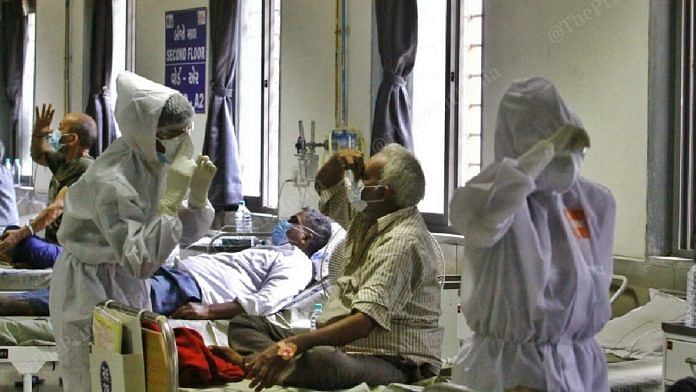
New Delhi: Hospitals across India are still struggling to manage novel coronavirus infections, in the absence of an effective drug to combat the disease. But now, another pathogen is posing a simultaneous threat to critically ill Covid-19 patients: A drug resistant superbug that lurks in hospital settings.
In a small study of 596 Covid-19 patients who were admitted to an ICU in Delhi between April and July this year, doctors found 15 patients (2.5 per cent) with a fungal infection called candidemia, that is resistant to drugs.
The study was conducted by researchers from the Vallabhbhai Patel Chest Institute of the University of Delhi, Max Health Care Institute and the International Centre for Genetic Engineering and Biotechnology.
Also read: 1 in 100 hospitalised Covid patients may get a punctured lung, finds new Cambridge study
The findings
Ten of the 15 patients were infected with the fungus species Candida auris, three with Candida albicans, one with Candida tropicalis and one with Candida krusei. All varieties cause the infection candidemia, though C. auris is the most prevalent and fatal.
Of these, eight died — a death rate of 53 per cent. Among those with a C. auris infection, the fatality rate was 60 per cent, according to the study.
C. auris, in particular, is known to affect hospitalised patients with weakened immune systems. Due to its ability to colonise skin, persist in environments, and cause hospital outbreaks and severe disease with high mortality rates, Candida auris is considered to be a global health threat.
Eight of the 10 patients infected by C. auris were between 66 and 88 years of age. All 10 were admitted to the ICU for prolonged periods — from 20 to 60 days — and almost all of them had underlying chronic conditions, including hypertension, diabetes mellitus and kidney and liver diseases.
The researchers found that on average, candidemia caused by C. auris developed 10 to 42 days after admission to hospital. Half the patients with C. auris infections had to undergo mechanical ventilation as a result of severe Covid-19 pneumonia.
Candidemia not uncommon
Hospital-acquired infections of C. auris are not unexpected. In June this year, two researchers from this team had predicted the potential transmission of multidrug resistant organisms like C. auris in hospital settings.
The team had reasoned that since both C. auris and SARS-CoV-2 have been found on hospital surfaces, including on bedrails, beds, air conditioner ducts, windows and hospital floors, the standard Covid-19 critical care involving ventilators puts patients at risk of infections by C. auris.
The spread of drug-resistant pathogens can significantly increase during epidemics for the simple reason that hospitals and healthcare workers become overburdened.
During the 2003 outbreak of the original SARS virus, there were reports of increased transmission of candida species, as well as bacteria known as methicillin-resistant Staphylococcus aureus (MRSA) among hospitalised SARS patients.
Also read: Two new fungus species in Netherlands and US named after Covid-19 pandemic

COMMENTS